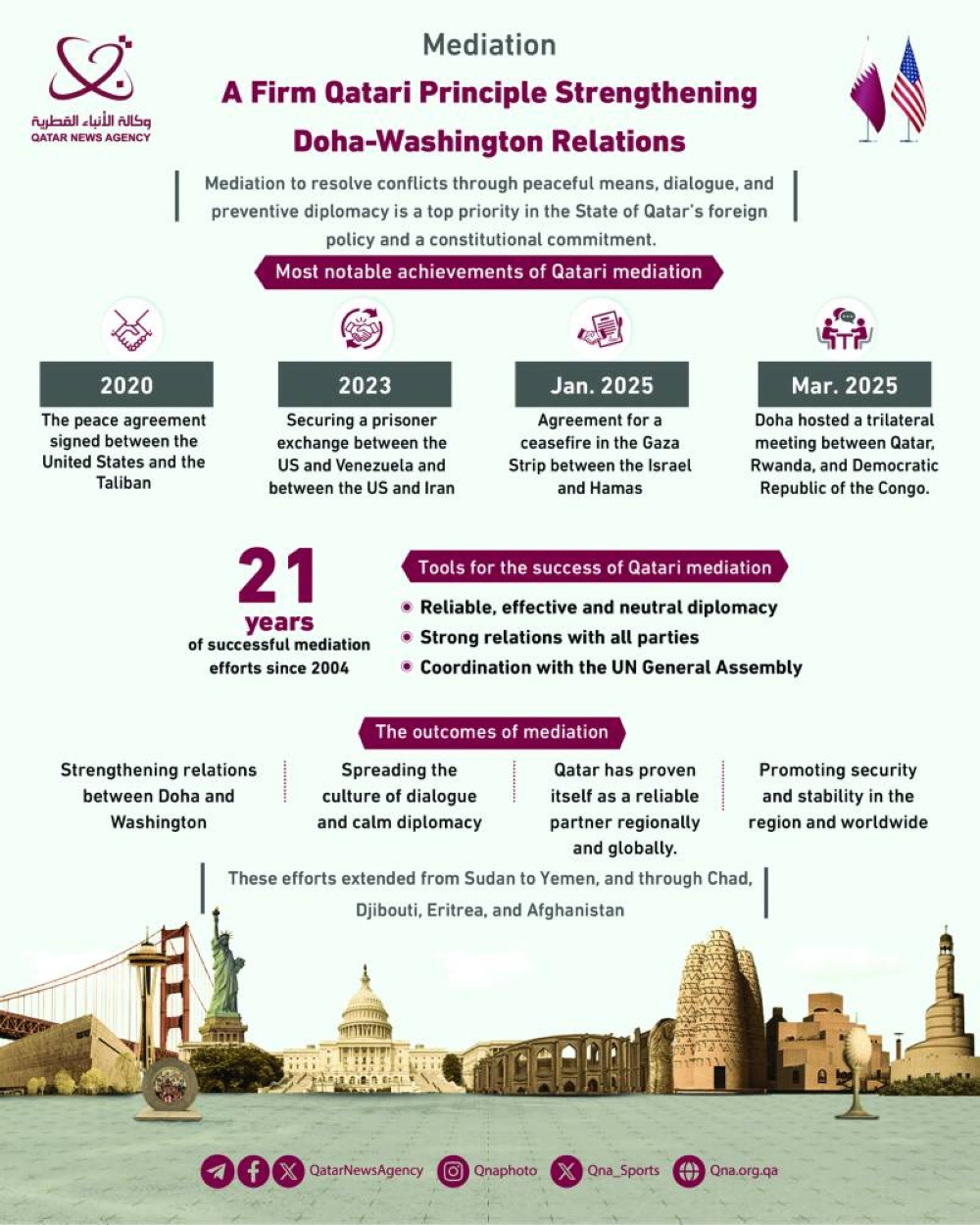Mediation to resolve conflicts through peaceful means, dialogue, and preventive diplomacy is a top priority in Qatar’s foreign policy and a constitutional commitment. Article 7 of the Permanent Constitution, issued in 2003, states: “The foreign policy of the state is based on the principles of strengthening international peace and security by means of encouraging the peaceful resolution of international disputes, supporting the right of peoples to self-determination, not interfering in the domestic affairs of other states, and co-operating with all peace-loving nations.”
Qatar has adhered to these principles and led successful mediation efforts since 2004, resulting in conflict resolutions and hostage releases in various parts of the world. These efforts have addressed ceasefires, the restoration of diplomatic relations, prisoner exchanges, support for national dialogues, border dispute resolutions, humanitarian assistance, and comprehensive peace agreements in regional and international conflicts.
Qatar has chosen this role based on the belief that mediation is the most effective way to prevent or de-escalate conflicts and to reduce the rising human, economic, and developmental costs. Accordingly, it has played an active role in promoting mediation in co-operation with the international community, including the United Nations Security Council and General Assembly, as well as with friendly countries, notably the United States.
Qatar’s record of mediation is filled with notable successes in resolving disputes between countries, political groups, armed factions, and opposition forces. These successes are attributed to the state’s reliable, effective, and neutral diplomacy, its strong relations with all parties, and its co-ordination with the United Nations General Assembly.
Among the most prominent achievements of Qatari mediation is the peace agreement signed in February 2020 between the United States and the Taliban, which marked the end of a 19-year war and paved the way for US troop withdrawal from Afghanistan.
Qatar also successfully mediated a prisoner exchange in August 2023 between the US and Iran, involving the release of five Iranians detained in the US and the unfreezing of $6bn in Iranian funds. In December 2023, Qatar announced the success of its mediation between the US and Venezuela, which led to the release of 10 American prisoners in exchange for a Venezuelan detainee held by the US, after several rounds of mediation.
In March 2025, Qatar facilitated the release of two American citizens, George Gleesman and Faye Hall, from Afghanistan. The US Department of State publicly thanked Qatar for its essential role and support in securing the release of American citizens in distress.
Additionally, in January 2025, Qatar, in co-ordination with the US and Egypt, successfully mediated a ceasefire agreement in the Gaza Strip between Israel and the Palestinian resistance movement Hamas. The agreement included a prisoner and detainee exchange and lasted two months. Despite the subsequent resumption of Israeli aggression, Qatar’s efforts continue, underscoring its commitment to alleviating the suffering of the Palestinian people in Gaza.
Earlier, in November 2023, Qatar also brokered a four-day humanitarian truce, extendable, which facilitated the exchange of 50 civilian women and children hostages held in Gaza for Palestinian women and children imprisoned in Israel. The truce also allowed for increased humanitarian aid, including fuel for critical services. Doha’s mediation efforts have extended beyond the Middle East. Qatar has played a crucial role in peace initiatives in Sudan, Yemen, Chad, Djibouti, Eritrea, and Afghanistan — regions where Qatari diplomacy has gained significant recognition.
On March 18, 2025, Doha hosted a trilateral summit between His Highness the Amir Sheikh Tamim bin Hamad al-Thani, President Paul Kagame of Rwanda, and President Felix Tshisekedi of the Democratic Republic of the Congo. The leaders reviewed progress in the Luanda and Nairobi peace processes and reaffirmed their commitment to an immediate and unconditional ceasefire, as agreed during the joint East African Community and Southern African Development Community summit in Dar es Salaam on February 8, 2025.
Presidents Kagame and Tshisekedi expressed their gratitude to Qatar and His Highness the Amir for hosting the productive meeting in Doha, which fostered trust and advanced efforts toward sustainable peace in the region.
Qatari mediation has also contributed to reuniting children separated due to the ongoing conflict between Russia and Ukraine since February 2022, demonstrating Qatar’s humanitarian and neutral stance in global crises.
These achievements have significantly strengthened Qatar’s bilateral relations with the United States. Washington continues to recognise and commend Qatar’s role in promoting international peace, security, and dialogue. Qatar’s mediation strategy is rooted in promoting a culture of calm diplomacy, trust-building, and conflict prevention, reinforcing its stature as a dependable international partner.
HE Dr Mohammed bin Abdulaziz al-Khulaifi, Minister of State at the Ministry of Foreign Affairs, reaffirmed Qatar’s appreciation for the fruitful co-operation between the Afghan caretaker government and the US. He emphasised that Qatar consistently seeks to activate mediation as a tool for resolving complex international disputes peacefully, grounded in its foreign policy principles prioritising dialogue and stability.
Qatar’s track record includes 21 years of successful mediation since 2004, marking a legacy of effective diplomacy. Its impartiality, integrity, and dedication have earned it credibility as a neutral arbiter trusted by all parties.
In summary, Qatari mediation has produced tangible diplomatic results, including:
• Strengthening Doha-Washington ties
• Spreading the culture of dialogue and calm diplomacy
• Positioning Qatar as a reliable regional and global partner
• Promoting security and stability in conflict-affected regions
These sustained efforts reflect Qatar’s unwavering dedication to mediation, peace-building, and international co-operation on all levels. (QNA)

